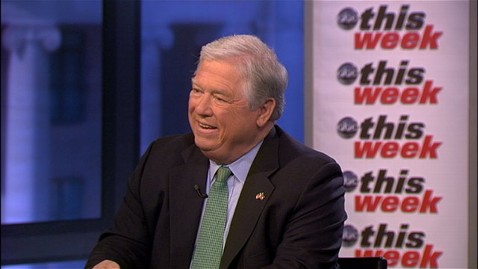Haley Barbour: Contested GOP Convention 'Not Necessarily Bad'

ABC
While he will not weigh in on who he thinks should get the GOP nomination, former Mississippi Gov. Haley Barbour said said on the "This Week" roundtable that it is growing more and more likely that it will be months before his party coalesces around a nominee and that there will likely be a contested Republican convention.
"We have had twice - three times really - Governor Romney looked like he was poised to begin coalescing, and each time he lost the next week, and now we're at another juncture," Barbour said.
Other GOP big hitters, such as Mike Huckabee, have said a brokered GOP convention would be a "train wreck" and a "disaster" for the party, Barbour said today such a scenario is "not necessarily bad."
"Whether or not we have an open convention is up to the primary voters who are left between now and there," Barbour said. "If it is a convention where we get there with nobody having the vote, [that is] not necessarily all bad."
But while he may not be very concerned about a candidate failing to capture enough delegates to lock up the nomination before the GOP convention, Barbour said the bitter infighting taking place en route to Tampa, Fla., where the Republicans will meet in August, could leave a scar.
"I don't think anybody in their right mind thinks that this way the primaries have played out has been good for the Republican chances," Barbour said. "But what to me is remarkable is it hasn't helped Obama much. If this Republican nick-nick-nick-nick kind of primary is really hurting, he ought to be soaring. Well, he's not soaring."
More people disapprove of the job President Obama is doing than those that approve. An ABC News/Washington Post poll last week showed 46 percent of respondents supported the president while 50 percent disapproved of the job he's doing.
Bill Burton, the leader of the pro-Obama s uper PAC Priorities USA, pointed out that while Obama's approval rating is not skyrocketing, the slugfest taking place within the Republican race is making the president comparatively more popular.
"Let's just take one state for example - Michigan," Burton said on "This Week." "Michigan, you had a real knockdown, drawn-out fight between Rick Santorum and Mitt Romney, and the result is that Mitt Romney is down 18 points to President Obama as a result of that primary in that state."
Such a drawn-out primary battle may echo the nearly year-long trek to the Democratic nomination four years ago, when Hillary Clinton and Obama duked it out until June. However, Burton argued that while the timeline may be similar to 2008, the storyline is vastly different.
"It's hard to say that this campaign is much like that campaign," Burton said. "You had two titans of the Democratic Party duking it out for the nomination, and this time around you've got Mitt Romney and Rick Santorum and Newt Gingrich fighting over whether or not Planned Parenthood should exist, fighting over contraception, duking it out over delegate math."
Burton added: "A long primary doesn't necessarily hurt the nominee that emerges, but in this case, I think it's hard to argue that Mitt Romney is stronger as a result of a long, extended fight."
Nia-Malika Henderson, national political reporter at the Washington Post, argued that while this long slog of a primary may weaken the eventual nominee, it is at least keeping the Republican base tuned in to presidential politics.
"I think one of the things that it's doing, this protracted race, is keeping the base energized," Henderson said. "If they feel like they at least had a shot at this thing with Santorum as a candidate, and in the end they lost, I've heard from Republicans that that would be essentially satisfying to them. They would feel like they, you know, they had their voices heard."